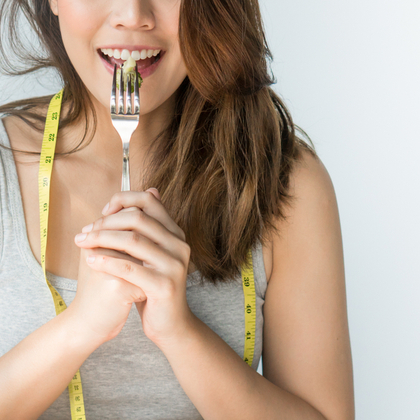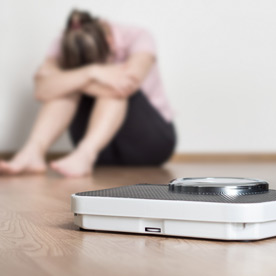Anyone who reads or watches the news knows that obesity is becoming an ever-greater problem in the UK and other western countries. Weight problems are rising – and have been doing so for some years now.
Findings from the most recent Health Survey for England estimate that 28.7 per cent of adults in England are obese and a further 35.6 per cent are overweight (but not obese). The survey also suggests men are slightly more likely than women to be either overweight or obese (67.2 per cent compared with 61.5 per cent), and that those aged 65 - 74 are the most likely to be overweight or obese (i).
Meanwhile data from the National Child Measurement Programme suggest 9.5 per cent of children aged 4 - 5 are obese and 12.8 per cent overweight, with 20.1 per cent of 10-11-year-olds obese and 14.2 per cent overweight (i).
Benefits of losing weight
Most people who embark on a weight-loss programme do so because they want to look slimmer. But losing weight doesn’t just affect your appearance. Indeed, there are numerous important health benefits associated with weight loss. That’s because being overweight or obese can lead to health problems such as:
-
Coronary heart disease
-
Some cancers (eg breast and bowel cancer)
-
Liver and kidney disease
-
Stroke
-
Gestational diabetes (diabetes during pregnancy)
Indeed, according to the NHS, obesity reduces life expectancy by an average of three to 10 years, and that being overweight or obese contributes to at least one in every 13 deaths in Europe (ii).
How to measure your weight
Years ago, health professionals used a height/weight chart to determine whether or not someone’s weight was healthy for their height. These days, this chart has largely been replaced by a different measurement called body mass index (BMI).
BMI also takes into account your height as well as your weight, and is calculated by dividing your weight in kilograms by your height in metres, then dividing the result by your height in metres again. The result will fall into one of several ranges, which account for the fact that people come in lots of different shapes and sizes:
-
BMI less than 18.5 = underweight
-
BMI between 18.5-24.9 = ideal
-
BMI between 25-29.9 = overweight
-
BMI between 30-39.9 = obese
-
BMI over 40 = very obese
However, if you’re black or are of south Asian or Chinese ethnicity, an ideal (healthy) BMI is lower than 25. That’s because, according to the National Institute for Health and Care Excellence (NICE), people from these populations have a higher risk of developing type 2 diabetes than white Europeans (iii).
You can calculate your BMI yourself or ask your GP to do it. Alternatively you can use the online NHS BMI healthy weight calculator.
Waist measurement
Many doctors are also using waist measurement to determine how your weight could be affecting your long-term health, as having a large amount of fat around your middle increases your risk for some health problems such as heart disease, type 2 diabetes, cancer and stroke (iv).
The good news is this is easy to do yourself. Find a tape measure and measure the point that’s half way between the bottom of your ribs and the top of your hip bone. According to the NHS, the ideal waist measurement for women is less than 80cm (32in) and for men 94cm (37in) (iv). If your waist measurement is higher, it could mean you have too much fat around your abdomen that may cause health problems.
It’s also a good idea to calculate your waist-to-hip ratio, as this can give an even more accurate estimation of any health risks that may be caused by your weight. After measuring your waist, measure your hips (the widest part), then divide the waist measurement by the hip measurement.
If you’re a woman, your waist-to-hip ratio should be 0.85 or less and 1.0 if you’re a man (v). If it’s higher, it suggests you’re carrying too much weight around your middle, and you may have a higher-than-normal risk of developing type 2 diabetes and heart disease.
Which diet: calories, fat or carbs?
If you need to lose weight, chances are one of the first things you’ll want to know is which weight-loss diet would be best for you.
These days there are any number of diets that promise fast and easy weight loss. You can choose diets based on any number of principles, such as low fat, high protein or low carb. You can eat nothing but raw food, dine like a caveman, chow down on baby food, fast on certain days of the week (or during certain phases of the moon) or choose foods based on your blood type.
New diets keep arriving, with each offering to make weight loss easier and faster than before. However – unfashionable as it may sound – if you want to lose weight and keep it off, your best bet is to make long-term changes to your lifestyle while aiming to lose 1-2lb each week. That’s because the diet that’s probably best for you is the one you can stick to in the long term.
Calories in, calories out
If you’re overweight, there’s a strong possibility that it’s because you consume more energy than your body needs – and you may well have been doing so for several years. Consuming less energy than your body needs (in other words, eating and drinking fewer calories than you burn) is arguably the most commonsense approach to losing weight. In fact, most diets – however faddy – boil down to this simple idea: it’s just the way they reduce the calories you consume that’s different.
According to the NHS, the average man needs around 2,500 calories a day to maintain their weight, while the average woman needs 2,000 a day (vi). If you aren’t very active, you may need fewer calories – or, if you exercise a lot (if you’re a sportsperson, for instance), you may need more.
However, if you want to lose weight at a steady rate of 1-2lb per week, experts recommend reducing your daily calories to 1,900 if you’re a man and 1,400 if you’re a woman (vii).
Balanced approach
The foods you eat that make up your daily calorie intake are also important, so try to eat a wide range of foods to make sure your body is getting all the nutrients it needs.
There are lots of things you can do to help you stick to your calorie limit without feeling hungry. Eating more fibre, for instance, will help you feel fuller for longer. So swap your white bread for wholemeal or wholegrain bread and eat lots of vegetables with every meal. Beans, lentils and peas are also good sources of fibre. Also aim to snack on fruit instead of sugary foods, as fruit is also full of fibre.
Protein can also help you feel full, so always have some at every meal (low-fat protein sources include beans, lentils and peas, eggs, low-fat dairy products, lean meat and skinless poultry, fish and vegetarian protein sources such as Quorn and tofu).
Also remember to choose healthier drinks such as sparkling water with a slice of lemon instead of a can of non-diet fizzy drink, or tea and coffee made with semi-skimmed or skimmed milk instead of full-fat milk.
Most importantly, be aware that healthy eating doesn’t have to be difficult or boring. Just try to make small changes to your diet such as swapping foods or ingredients that are high in calories, fat and sugar for healthier alternatives.
To find out how many calories are in foods, why not use an online calorie website such as www.myfitnesspal.com or use the NHS calorie checker
Quick tips for shedding pounds
Whatever diet or eating plan you decide to follow, losing weight seldom comes easily. So here are some healthy eating tips that could make a difference.
Use a smaller plate
Portion control is really important if you want to lose weight successfully, but it’s not always easy to achieve. One way of eating smaller portions is to switch to a smaller plate. According to the NHS, by using smaller plates and bowls you may be able to gradually get used to eating smaller portions without going hungry (viii).
Be more active
Exercise can help you to burn off more calories as well as provide lots of valuable health benefits. Aim to do 150 minutes of moderate activity every week to stay healthy – though if weight loss is your aim, you may need to do more.
Sit up straight
If you want to feel fuller faster, sit up straight when you’re eating, as it makes it easier for food get into the lower part of your stomach – where it sends signals to your brain that you’re full.
Drink yourself slim
Drinks may not fill you up in the same way that solid foods do, but remember that they also contain calories. So try to start being more aware of the calories in drinks. Fruit juice, for example, may sound like an ideal choice, but it’s usually high in sugar, which means it’s high in calories. Consider having water instead, or dilute a much smaller amount of juice with water if you don’t like the taste of water on its own.
Turn up the lights
Try to eat in bright light whenever possible, as low lighting may to encourage overeating (the idea is that dim light encourages you to let go of inhibitions, which may make you eat more).
Eat more fish
Some scientists believe people who eat fish on a regular basis may have lower levels of a hormone that stimulates the appetite, called leptin (ix). Keep the calories down by steaming or grilling your fish instead of frying.
Avoid distractions
Instead of eating in front of the TV, switch off and sit at the table, where you can concentrate on your food and eat more mindfully. Experts believe watching TV while you eat takes your mind off how much you’re eating, which means you could end up eating more.
Ask for a doggy bag
Many people finish everything on their plate when they eat out, even when they may feel just as satisfied by eating less. If you can’t bear to leave good food at restaurants, try to get into the habit of eating half your meal and take the rest home with you to eat the next day.
Sleep well
When you’re tired, it’s likely that you feel hungry too. That may be because lack of sleep affects hormones that control your appetite, making you want to eat more. Having a good night’s sleep can help keep your appetite in check. Read our guide to sleep and insomnia for tips on sleeping better.
Natural support for weight loss
If you’re trying to lose weight, there are several natural supplements that may help. Some can support you in general by plugging any shortfalls in your diet caused by calorie restriction, while others may help by boosting your body’s ability to burn more fat and calories.
Conjugated linoleic acid (CLA)
There is some evidence (x) to suggest CLA might influence the way the body stores fat and muscle (that is, some researchers believe it may help reduce fat and boost muscle). However, there are also concerns that it may have a negative effect on blood sugar control in people with type 2 diabetes (xi). As a result, people with type 2 diabetes are advised to consult their GP before taking CLA.
Green coffee extract
Green coffee beans are simply coffee beans that haven’t been roasted. But the process of roasting alters the chemicals found in the beans, and many researchers are looking into the idea that these unroasted coffee beans may have health benefits. One of these health benefits may be weight loss – though unfortunately the only evidence we have for this at the moment is found in animal, not human, studies (xii). The main ingredient in green coffee bean extract currently being studied for weight loss benefits is chlorogenic acid.
Chilli extract
An active ingredient in chilli peppers called capsaicin is believed to stimulate metabolism, meaning it may help you to burn more calories. This is often thought to work by increasing heat production in the body, though it’s also thought that eating capsaicin may reduce hunger while helping you to feel fuller. As such, some researchers believe taking capsaicin in supplement form could be helpful in weight management (xiii).
Glucomannan
A soluble dietary fibre derived from the roots of the konjac plant, glucomannan is widely used in Japan to make a jelly called konyaku. It’s virtually tasteless and can swell up to 17 its volume when water is added to it, which means it can help to fill you up without having to eat hardly any calories – plus you don’t need much of it to boost your fibre intake. There’s also evidence it may be effective in promoting weight loss (xiv).
Green tea extract
Often recommended for weight loss, green tea is thought to help you burn calories by speeding up your metabolism (xv). Rich in beneficial plant substances called polyphenols, green tea also contains a small amount of caffeine, which may also slightly boost weight loss and help prevent weight gain (xvi).
High-strength multivitamin and mineral
Many people trying to lose weight follow a calorie-controlled diet – which means eating less food and potentially reducing their intake of important nutrients. As a result, many natural practitioners recommend taking a good-quality multivitamin and mineral supplement to help offset any shortfalls in calorie-restriction diets. This may help to support the body during weight loss by preventing deficiencies.
Fish oils
An important nutrient that may fall short in a calorie-restrictive diet is omega-3 fatty acids. Found mainly in oily fish such as trout, herring, salmon, sardines and pilchards, omega-3 fats have many health benefits. If you’re not eating a sufficient amount of oily fish as a result of being on a diet, taking a good-quality fish oil supplement can help (the NHS recommends a healthy diet includes at least two portions of fish a week, one if which should be oily(xvii)).
There are various ways to lose weight, but this should always be done in a healthy manner. The best way will be to control your diet and make sure you get some exercise. To find out more about common tips and treatments for common health conditions you can visit our health library.
References:
-
Available online: https://commonslibrary.parliament.uk/research-briefings/sn03336/
-
Available online: https://www.nhs.uk/conditions/obesity/
-
Available online: https://www.nhs.uk/conditions/obesity/
-
Available online: https://www.nice.org.uk/guidance/ph46/documents/bmi-and-waist-circumference-black-and-minority-ethnic-groups-draft-guidance2
-
Available online: https://www.nhs.uk/common-health-questions/lifestyle/why-is-my-waist-size-important/
-
Available online: https://patient.info/doctor/waist-to-hip-ratio
-
Available online: https://www.nhs.uk/common-health-questions/food-and-diet/what-should-my-daily-intake-of-calories-be/
-
Available online: https://www.nhs.uk/live-well/healthy-weight/start-the-nhs-weight-loss-plan/
-
Available online: https://www.nhs.uk/live-well/healthy-weight/12-tips-to-help-you-lose-weight/
-
Winnicki M. et al., Fish-Rich Diet, Leptin, and Body Mass. Circulation. 2002 Jul 16;106(3):289-91. Available online: https://www.ahajournals.org/doi/full/10.1161/01.cir.0000025241.01418.4d
-
Blankson. H, Stakkestad. JA, Fagertun. H, et al. Conjugated linoleic acid reduces body fat mass in overweight and obese humans. J Nutr. 2000;130:2943-2948. Available online: https://academic.oup.com/jn/article/130/12/2943/4686248
Whigham. LD, Watras. AC, Schoelle.r DA. Efficacy of conjugated linoleic acid for reducing fat mass: a meta-analysis in humans. Am J Clin Nutr. 2007;85:1203-1211. Available online: https://academic.oup.com/ajcn/article/85/5/1203/4632999 -
Moloney. F, Yeow. TP, Mullen. A, et al. Conjugated linoleic acid supplementation, insulin sensitivity, and lipoprotein metabolism in patients with type 2 diabetes mellitus. Am J Clin Nutr. 2004;80:887-895. Available online: https://academic.oup.com/ajcn/article/80/4/887/4690392
Riserus. U, Vessby. B Arner. P, et al. Supplementation with trans10 cis12-conjugated linoleic acid induces hyperproinsulinaemia in obese men: close association with impaired insulin sensitivity. Diabetologia. 2004 May 28. Available online: https://link.springer.com/article/10.1007/s00125-004-1421-8 -
Shimoda. H, Seki. E, Aitani. M. Inhibitory effect of green coffee bean extract on fat accumulation and body weight gain in mice. BMC Complementary and Alternative Medicine. 2006;6:9. Available online: https://www.ncbi.nlm.nih.gov/pmc/articles/PMC1513603/
-
Tremblay. A, Arguin. H, Panahi. S. Capsaicinoids: a spicy solution to the management of obesity? Int J Obes (Lond). 2015 Dec 21 doi: 10.1038/ijo.2015.253. Available online: https://www.nature.com/articles/ijo2015253
-
Walsh. DE, Yaghoubian. V, Behforooz. A. Effect of glucomannan on obese patients: a clinical study. Int J Obes. 1984;8:289-293. Available online: https://pubmed.ncbi.nlm.nih.gov/6096282/
Kaats. GR, Bagchi. D, Preuss. HG. Konjac Glucomannan Dietary Supplementation Causes Signifcant Fat Loss in Compliant Overweight Adults. J Am Coll Nutr. 2015 Oct22:1-7. Available online: https://pubmed.ncbi.nlm.nih.gov/26492494/ -
Dulloo. AG, Seydoux. J, Girardier. L, et al. Green tea and thermogenesis: interactions between catechin-polyphenols, caffeine and sympathetic activity. Int J Obes Relat Metab Disord. 2000;24:252-258. Available online: https://www.nature.com/articles/0801101
-
Westerterp-Plantenga. MS, Lejeune. MP, Kovacs. EM, et al. Body weight loss and weight maintenance in relation to habitual caffeine intake and green tea supplementation. Obes Res. 2005 Jul;13(7):1195-204. Available online: https://onlinelibrary.wiley.com/doi/full/10.1038/oby.2005.142
-
Available online: https://www.nhs.uk/live-well/eat-well/fish-and-shellfish-nutrition/
Related Posts
Disclaimer: The information presented by Nature's Best is for informational purposes only. It is based on scientific studies (human, animal, or in vitro), clinical experience, or traditional usage as cited in each article. The results reported may not necessarily occur in all individuals. Self-treatment is not recommended for life-threatening conditions that require medical treatment under a doctor's care. For many of the conditions discussed, treatment with prescription or over the counter medication is also available. Consult your doctor, practitioner, and/or pharmacist for any health problem and before using any supplements or before making any changes in prescribed medications.

Christine
Christine Morgan has been a freelance health and wellbeing journalist for almost 20 years, having written for numerous publications including the Daily Mirror, S Magazine, Top Sante, Healthy, Woman & Home, Zest, Allergy, Healthy Times and Pregnancy & Birth; she has also edited several titles such as Women’ Health, Shine’s Real Health & Beauty and All About Health.
View More



